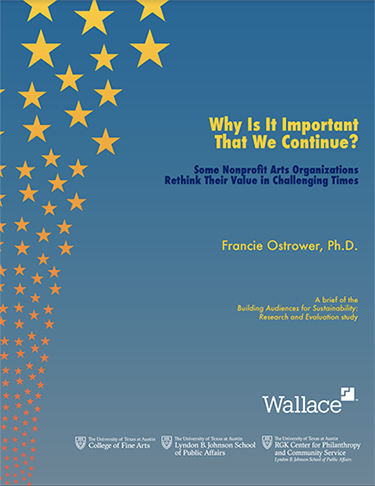Report
Why Is It Important That We Continue? Some Nonprofit Arts Organizations Rethink Their Value in Challenging Times

"'I actually don't believe any organization should exist just for the sake of its own self, just for the sake of existing. But rather, what is it doing? What is its mission? What is its service to the community?' This comment was made by an associate artistic director at one of the 25 performing arts organizations in The Wallace Foundation's Building Audiences for Sustainability (BAS) initiative. As the comment reflects, sustainability per se should not be an end for nonprofit organizations, but rather a means for pursuing mission-related goals. That is why, as we started our University of Texas at Austin research evaluation of the multi-year audience-building initiative, we asked leaders and staff at participating organizations why they believe it is important that their organizations continue.
That was in 2016.1 The initiative ended in 2019. Within months performing arts organizations would face dramatically altered circumstances. The COVID-19 pandemic shuttered performances around the country and protests against racial injustice challenged large established arts institutions to reform their practices in the interest of greater diversity, equity, and inclusion.2 If anything, these circumstances have only increased the relevance and urgency of questions about organizational value and sustainability. Thus, it seems like an opportune moment to ask where these organizations were in their thinking before the world changed so dramatically. As we shall see, their comments surfaced challenges, tensions, and decisions about organizational value that go beyond their individual organizations and are relevant to large, established nonprofit arts organizations more broadly.3
Virtually everyone interviewed believed it was important that their organizations continue, offering passionate accounts of the value of the arts, their art forms, and their organizations.4 Noteworthy, however, was that a substantial portion also believed that changes were needed to remain important. This change involved rethinking the organization's relationship with the community. Encapsulating this view, the general director of one opera company said, "We have to reinvent ourselves, never to lose our focus on being a world-class opera company, but to understand that to be truly relevant to a city like [ours] . . . we have to change."
Today, the scope, urgency, and the level of calls for change have amplified. And, it must be said, the BAS initiative itself, which awarded almost $41 million to this group of relatively affluent and virtually entirely white-led group of organizations, would be questioned today as exemplifying inequities in philanthropic support that favor such organizations at the expense of smaller institutions and those founded and led by people of color.5 Nonetheless, these institutions do exist and continue to command substantial resources. In our final round of interviews, we are asking BAS participants about the impact of both the pandemic and calls for equity, diversity, and inclusion on their thinking, plans, and activities. We are also revisiting the question of why they believe it is important that their organizations continue to exist. At this point, in this short interim brief, we share their comments from an earlier time in the spirit of contributing to conversations and questions about future directions for such organizations."
Research Topic
Management and Governance of Nonprofit Organizations

